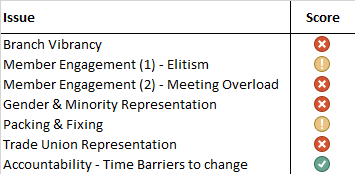One of the reforms made at #Lab18 was to make the adoption of All Member Meetings (AMM) as the Governance structure of a CLP easier. We tried this in Lewisham Deptford in 2012 for six months. I wrote about the debate at which we chose to revert to Branch & Delegate structures in Feb. 2013. It’s another of these ironies that it was originally pushed by Progress and the Blair’s leadership as a means of side-lining local leaderships, but it is seen today as a tool of Momentum to re-engineer the Party in its own image.
Have my views changed? I have reproduced an updated version of my balance sheet below, but most importantly,
All Member Meetings kill branches, organizationally, politically and socially.
All Member Meetings kill branches, organizationally, politically and socially. They may exacerbate the stridency of factional dispute as the factions do not even unite in the branches around common tasks such as election campaigning and fund raising. Most members given a choice between one of two meetings will choose the CLP level AMM where policy and politics are discussed. Furthermore, my experience is that where branches do policy development and political education, they are more active and vibrant and more likely to grow.
It’s most powerful argument is that the delegate based system is elitist and excludes people. Our experience, we trialled it for 6 months, is that the chief beneficiaries of the move to AMM was those councillors not on the General Committee. We were a party of 750 and about to win every council seat in the constituency bar one. There were few ordinary members that took advantage of the right to attend AMMs although the party is much larger now and circumstances might be different.
We also should recognise that some people may for many reasons not wish to attend meetings, and are happy to elect delegates to represent them. (This may be influenced by the geographic size of the constituency, East Hampshire, not the largest by a long way, is nearly 200 sq. miles, while Lewisham Deptford, where I live now, is 14.)
Gender Quotas cannot be applied to AMMs.
Some people argued that AMMs are easier to pack, but my experience over the last three years that while the left may seek to win meetings by recruiting members[1] and talking politics, there are others who have strong networks and use Trade Union links and the Socialist Societies to win places on delegate based GCs which at times are of questionable existence or compliance with the rules.
On the other hand, when the Trade Union link works genuinely, it’s a tremendous asset to the Labour Party as the good relationships between our CLP and the local Trades Council goes to show, but aggressive or corrupt manipulation of the rules damages the link, and is part of[2] what led to the booing of the Trade Union delegates at #Lab18.
All member meetings will be administratively more expensive both in terms of room rental and real mail, although you can’t claim that it won’t benefit many people and that it will be more expensive. Brighton District CLP had over 600 people at their 2015 AGM (about 10%) and had to circulate people through the room, recent Parliamentary selections across the country have attracted from 35% to 50% of the membership. Some CLPs now have over 2000 members and booking a room large enough to accommodate a high turnout AMM is challenging.
All member’s meetings diminish the Trade Union link as Unions cannot appoint additional voting members. As I have said, so does fraudulent behaviour as obviously occurred in the Newham Mayoral trigger ballot albeit by a socialist society and we all know of CLPs where the affiliate delegates outnumber those appointed by the membership branches. I also know of CLPs where the number of branch delegates is capped[3], but where it works well, it is a massive asset to the Labour Party. The Socialist Society’s relationship with AMM led CLPs is also weakened but the value of the Socialist Societies to the Labour Party is in their policy development and campaigning and as stated here and elsewhere their affiliations in some cases are used to block the will of the individual membership.

We should bear in mind that AMM governance model wasn’t designed to be effective, it was designed to weaken the voice of activists against the leadership.
AMMs increases accountability of the management meeting to the membership because there’s no waiting period for new members to participate in the management of the local party, they need neither wait for a branch AGM nor wait for a space in the GC delegations. I think that the Branch and Delegate GC’s have taken longer to become representative of the current membership because of this built in delay. The competition for places in my local party, means that good people have not been elected to the GC and their contribution to the Party’s management will be missed.
Finally, I think constituency geography counts, I am not sure how but it would seem to me compelling that large rural constituencies might benefit from a branch and delegate structure to maximise the administrative simplicity and minimize the cost of the meetings but I am basically of the view that the arguments to adopt AMM is not compelling.
I would also add that the case that AMM is more democratic is far from proven; I am not sure how you measure the democracyness of a governance structure although I have looked at means in this article and this article.
ooOOOoo
[1] Although it all turned to shit in Falkirk; https://davelevy.info/the-end-of-the-road-from-falkirk/
[2] Another part is the naivete and self-entitlement of the supporters of open selection.
[3] This has the effect in large parties of reducing the proportion of delegates representing and elected by individual members. …

